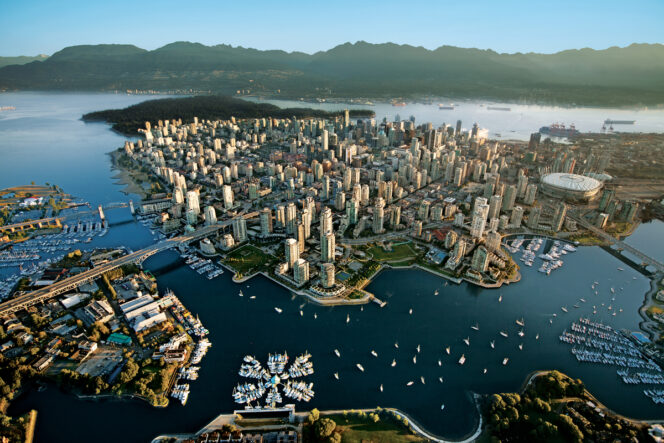
Photo: Destination Vancouver/Albert Normandin
If you wander around the streets and landmarks of Vancouver, you’re bound to come across filming in progress: besides the cast involved in the on-camera work, you’ll see a host of other crew members doing behind the camera work, as well as other individuals involved in catering, equipment rental, and location set-up.
Countless well-known movies and televisions shows have been filmed in this city, including Deadpool, Riverdale, and Fifty Shades of Grey. Vancouver has become known as ‘Hollywood North’, with the motion picture industry spending about $2 billion a year in B.C. and employing approximately 25,000 people, both directly and indirectly (Creative BC Stats).
But with so much impact comes responsibility, especially environmental.
Inspiringly, the motion picture industry in Vancouver is leading the way in becoming green. As Zena Harris says, “Vancouver is known as a hot spot for sustainable production.” Harris is Creative Director of the Sustainable Production Forum (SPF), an annual conference that brings together individuals from across the media sector to discuss and collaborate on sustainable initiatives. Harris is also the Founder and President of Green Spark Group, which specializes in sustainability consultancy for the entertainment industry.
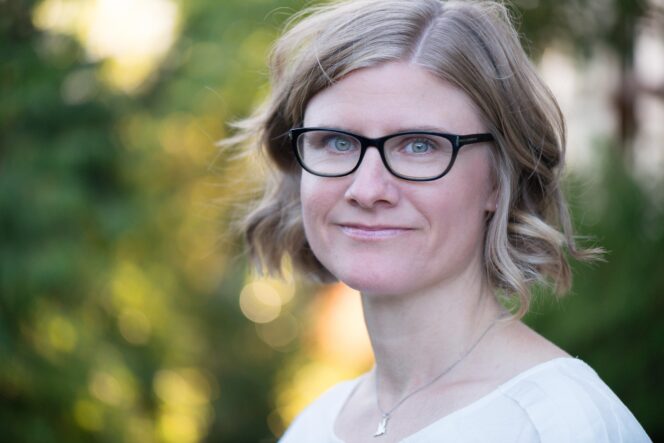
Zena Harris; Photo: Green Spark Group
This year’s SPF takes place virtually from October 25 to 29. The industry has come a long way since the conference was first hosted by the Vancouver International Film Festival (VIFF) in 2016. At the time, the SPF was the first of its kind in North America, with high profile speakers like Chris Carter, directory of The X-Files, then mayor Gregor Robertson, and executives from major Hollywood studios.
“The initial intent was to essentially knowledge-share on the topic of sustainable production. Vancouver was doing really well. BC had just refocused on a program called Reel Green, which was out of the Film Commission at Creative BC. And I realized that there were different hubs around the world all talking about sustainable production but no one was coming together to share knowledge and information,” says Harris. As a result, the SPF was born.
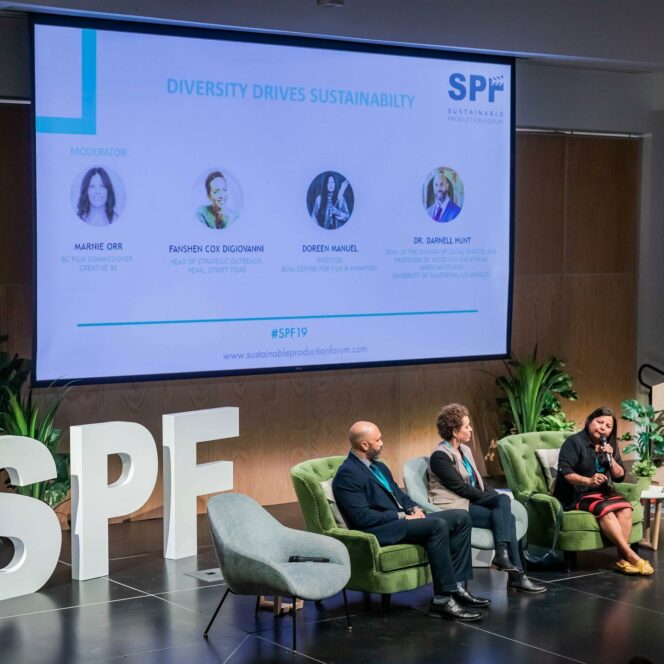
Panel from a previous SPF; Photo: Green Spark Group
But what exactly is sustainable production? “When we think of sustainable production, we’re thinking about how to integrate sustainable practices into the film production industry, and that can happen at multiple levels,” says Harris. She explains that while people often think only of the filming on location, there are actually multiple, interconnected layers to Vancouver’s film and TV industry, which all have a potential role to play in sustainability. Levels include studios, as well as stakeholders, like unions, guilds, and production facility owners.
Harris says that there are numerous actions that could be taken to make a film production more sustainable. For example, “We know that fuel consumption is the number one contributor to a production’s greenhouse gas emission profile,” she says. Reducing consumption is therefore a huge priority. Harris references a 2021 report on Carbon Emissions of Film and Television Production, prepared by Sustainable Production Alliance, which advocates transitioning to clean, renewable energy and prioritizing energy efficiency for production vehicles and generators.
Concretely, Harris says decreasing fuel consumption in the Vancouver motion picture industry can be as simple as not idling vehicles. “Another aspect where Vancouver has really been a leader is alternative power stations. When we reduce the use of diesel generators by using battery power stations, that is a key way to reduce fuel consumption,” she says. Excitingly, Vancouver has been a pioneer, with three companies that make battery power stations: Portable Electric, MBS Equipment Company, and William F. White International.
Additional innovative initiatives involve the City of Vancouver. The film and TV industry is currently actively working with the City and Reel Green to map out film hot spots for creating kiosks that will allow film productions to plug into the city’s power grid. “This is being highlighted in other jurisdictions around the world as an example to follow,” says Harris. The City also has an incentive program so that productions can get half of their daily permit fee back if they can demonstrate that they have used alternative power versus diesel generators.
“This is why Vancouver is known as a sustainable production hub because we have the vendors and the infrastructure in development. It’s huge – and all of this is being talked about at SPF,” says Harris.
The theme for the sixth SPF, which will have a global reach due to its virtual platform, is Breaking Barriers, spotlighting “disrupters, artists, innovators, and forward thinkers.” “This year, we’re focusing on breaking barriers in multiple contexts with the various special topics that we have. We don’t have time to wait around for things to just play out. We need to keep pushing forward,” says Harris. She explains that there are barriers at every level, from individual crew members not feeling that they have the power to implement sustainable production practices, to internal communication barriers within a studio.
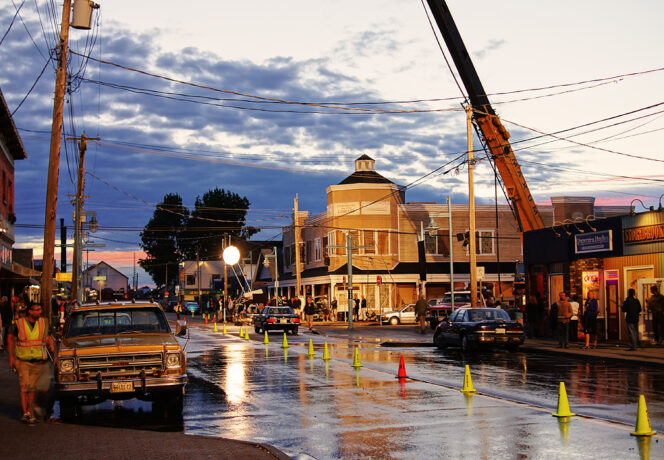
Filming Once Upon a Time in Richmond (Steveston); Flickr – TOTORORO.RORO (Inside Vancouver Flickr Photo Pool)
The panels for the SPF cover a wide range of topics related to Breaking Barriers, such as “Telling Stories on the Land: Indigenous Screen Storytelling and the Environment” (October 27 from 12:30pm to 1:30pm PT) and “Emission Reduction and Municipal Collaboration (October 29 from noon to 1pm PT). Speakers include Dorothy Fortenberry, Writer and Supervising Producer for The Handmaid’s Tale and Adrienne Pfeiffer, Environmental Sustainability Manager at Lucasfilm.
On October 25, SPF has two sessions that aim to shift the industry mindset: “Circularity: Everything IN needs an EXIT plan” (1:15pm to 2:15pm PT) and “Circular Economy: A Global Solution (10am to 11am PT). Harris says that a circular economy mindset is more than just bins for composting; it’s about a fundamental change in thinking that works to keep the materials coming into a production site in circulation. “How do we train the industry to be more circular, to design out waste?” Harris asks.
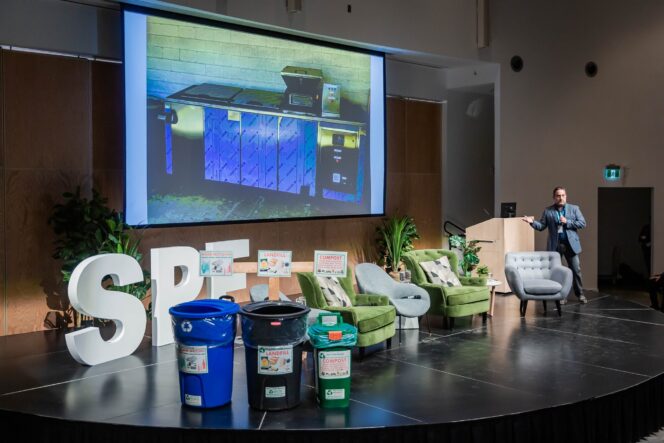
Photo from previous SPF; Photo: Green Spark Group
A session called “It’s All In The Narrative” (October 25, noon to 1pm PT) highlights that film and TV content is very important as well in spreading the message about sustainability. “What is shown on screen, not only the content but also the way people are living and using various products, has an enormous effect on people,” says Harris. In other words, characters can drive electric cars and compost, the theme of a movie can be sustainability, and writers can explore new genres that support environmental messaging.
Harris cites the film and TV industry’s adaptability and collaboration during the pandemic as evidence that it can mobilize rapidly, in this case, on climate change. “We want people to feel empowered and emboldened, and we want to inspire action now because we have all the tools and technologies in place. We have the most creative industry in the world. There is no reason why we can’t move forward very quickly,” she says.
She names Vancouver Film Studios as a case study of a company that has become a “leader in the built environment space” through their extensive sustainability strategies, which include B Corporation certification, Climate Smart certification, and the signing of The Creative Industries Pact for Sustainable Action.
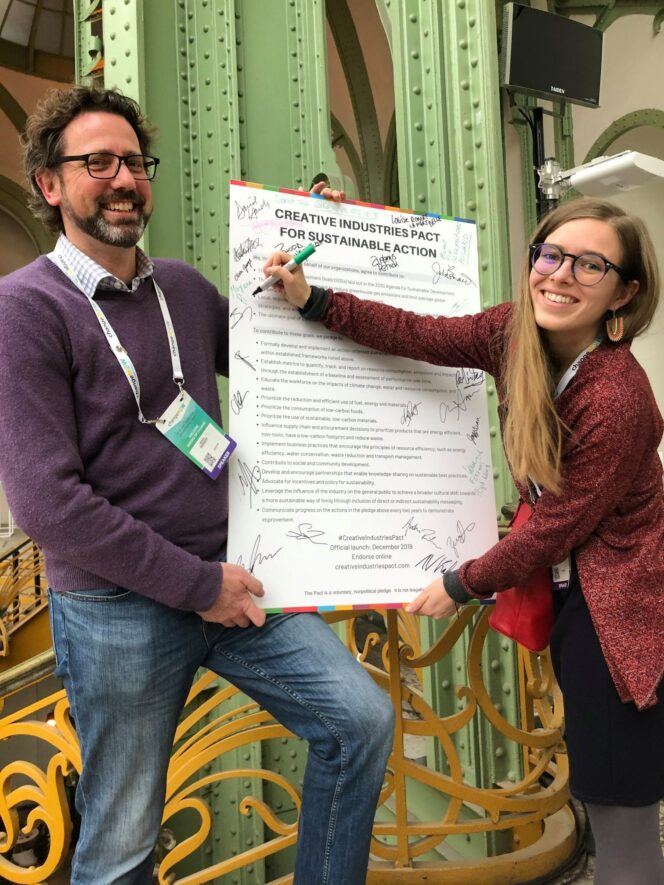
Andrew Robinson of Green Spark Group; Photo: Green Spark Group
Harris remains hopeful about the future but underlines the need for more sustainable action industry-wide: “There are so many great actions happening in Vancouver, but we have to keep pushing forward. I want to stress the urgency factor. We have a lot more work to do, and we can’t rest on our laurels.”
















